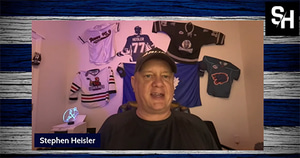JuniorHockey.io
GAME CHANGER: HOW NCAA'S NEW RULE ON CHL PLAYERS ALTERS HOCKEY RECRUITING What Aspiring College Athletes Need to Know Now: Essential Strategies to Stay Competitive Amidst NCAA's CHL Eligibility Change
Nov 15, 2024
Over the past few years, we at the
Victorious Hockey Company have been preparing our clients and prospects for an
impending seismic shift in the college hockey landscape. That shift has now
arrived.
Background: The
Evolution of Amateurism in College Sports
In 2021, the NCAA adopted Name, Image, and Likeness (NIL)
policies, allowing student-athletes to profit from their personal brands. This
marked a significant departure from traditional amateurism principles,
acknowledging athletes' rights to earn compensation while maintaining
collegiate eligibility. The NIL adoption prompted a reevaluation of what
constitutes professionalism in college sports.
With the NIL framework in place, the NCAA faced growing
scrutiny over its stance on Canadian Hockey League (CHL) players. Critics
argued that if NCAA athletes could earn money through NIL deals without
forfeiting eligibility, the stipends received by CHL players should not
disqualify them from collegiate competition. This perspective gained traction,
leading to legal challenges alleging that the NCAA's prohibition of CHL players
violated U.S. antitrust laws by unlawfully restricting their opportunities.
The NCAA's Decision
and Immediate Impact
Compelled by legal pressures and the evolving NIL
landscape, the NCAA recently voted to allow CHL players to retain eligibility
for Division I men's ice hockey, effective from the 2025-2026 season. This
decision has sent immediate waves across junior and collegiate hockey.
First CHL Players
Announce NCAA Commitments
Within hours of the rule's approval, several CHL players
announced their NCAA commitments, highlighting the swift impact of the new
eligibility rule:
- Hayden Reid: The 18-year-old forward from Clarington, Ontario, recently joined the OHL's Flint Firebirds from the USHL's Sioux Falls Stampede and has a verbal commitment to play at the University of Minnesota. Reid's quick shift to the CHL demonstrates how players will leverage this flexibility to balance CHL experience with NCAA aspirations.
- Blake Montgomery: A 19-year-old Ottawa Senators prospect and forward who verbally committed to the University of Wisconsin, Montgomery joined the OHL's London Knights from the USHL's Lincoln Stars after the rule change. With 10 points in 10 games for the Stars, his choice showcases how high-caliber CHL talent will make waves in NCAA recruiting.
- Jackson Parsons: The 19-year-old goaltender for the OHL's Kitchener Rangers wasted no time committing to Clarkson University. Parsons, boasting an impressive record of 9-2-1 with a 2.73 goals-against average and a .905 save percentage, will bring valuable experience and skill to the college level.
These early commitments are just the beginning. As CHL
players explore NCAA opportunities, the talent pool will become increasingly
competitive, affecting recruiting strategies at every level of college hockey.
Impact on NCAA
Division I Recruiting
NCAA Division I programs now have access to a larger pool
of experienced junior players from the CHL, United States Hockey League (USHL),
and British Columbia Hockey League (BCHL). The inclusion of CHL players—many
with high-level competitive experience—introduces new challenges for existing
NCAA prospects and could redefine the criteria for Division I recruits.
Colleges are likely to focus more on recruiting from these premier leagues,
potentially diminishing opportunities for players in other junior circuits.
Strategies for
Non-CHL Junior Hockey Players
For junior players outside the CHL, adapting to this new
recruiting landscape is essential. With Division I spots likely to be filled by
CHL, USHL, and BCHL players, many NCAA hopefuls may need to consider Division
III or American Collegiate Hockey Association (ACHA) programs. This shift will
increase competition at all levels, necessitating a strategic approach to
recruitment.
How Non-CHL Junior
Players Can Get Ahead
- Build Relationships with Coaches Early: Establishing strong relationships with coaches before recruitment decisions are finalized is crucial. Non-CHL players should focus on networking and demonstrating their dedication and skills early on. At Victorious Hockey Company, we specialize in helping players forge these connections, ensuring they are top-of-mind during recruitment.
- Showcase Commitment to Development: Demonstrate a strong commitment to personal growth through skill development, physical conditioning, and game intelligence. Highlighting continuous improvement can help level the playing field against CHL counterparts.
- Maximize Visibility in Key Junior Leagues: As Division I programs focus on CHL and USHL recruitment, Division III will draw heavily from the North American Hockey League (NAHL) and National Collegiate Development Conference (NCDC). Players should maximize visibility through showcases, engaging with scouts, and delivering standout performances.
- Adapt to the "Trickle-Down" Effect: The influx of CHL players into NCAA recruiting will push USHL and BCHL players to seek opportunities in Division III and ACHA, intensifying competition. Recognizing this shift early and adjusting goals can expand opportunities for non-CHL players who act strategically.
Victorious Hockey
Company: Your Partner in Navigating This New Landscape
At Victorious Hockey Company, we understand the challenges
players face in this evolving environment. With CHL players already committing
to NCAA programs, the window for making a positive impression is narrowing. Our
team is here to help you navigate these changes, build early relationships with
coaches, and secure opportunities that align with your skills and aspirations.
Don't Let Your Hard
Work Fall Short
"Do not let all the hard work you have already put in
fall short of getting you where you should be."
This NCAA rule change signals an urgent need for players to
act swiftly, build relationships, and secure their place in the competitive
landscape. The path to NCAA and ACHA hockey may look different today, but with
the right support, you can still achieve your goals and capitalize on the
opportunities this new era presents.
Contact Victorious Hockey Company today to ensure you're fully prepared to navigate this new
chapter in college hockey. Let us help turn your hard work and dedication into
realized potential and collegiate success.
